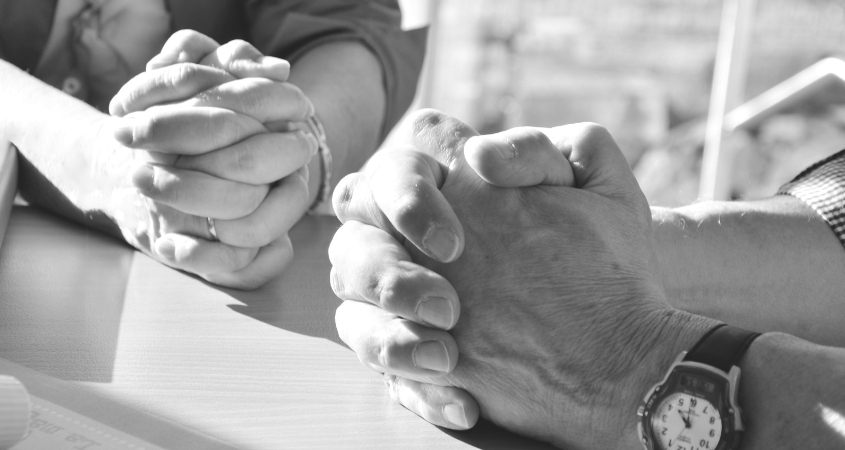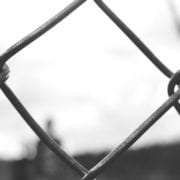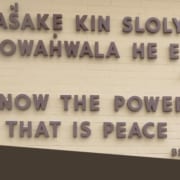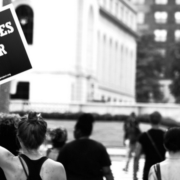A Justice That Seeks Faith: Inviting God into Unwelcomed Spaces
BY RACHEL SWENARTON | September 7, 2018
By the end of college, I became wholly motivated by the idea of working for a faith that does justice. A Jesuit education affirmed my belief that my spirituality should not be built on outdated scriptures that left me feeling alone or oppressed; rather, it should be built on the ideas of accompanying others and creating more equitable communities. The idea of building my faith on my passion for social justice was inspiring and important. As of recent, I can’t help but feel it also may have been all too simple.
I no longer live on the campus of a Catholic university. I don’t sit at my parents’ table where we say a prayer before we eat dinner together every night. Without these daily physical reminders of the religion I grew up with, the choice of whether or not to prioritize my faith is, all too suddenly, my own responsibility.

Just last year I was walking around buildings that had the words “faith that does justice” water-colored on paper and taped to the wall. As a JV, I’m now in a world that feels many miles away from the comfortable and calm churches and classrooms I’ve known—working and living in Anchorage, AK with a community of the homeless, the addicted, the traumatized, and the marginalized. It feels much more accurate to say that I am working for a justice that desperately seeks faith.

Rachel backpacking into the Chugach during the changing seasons in Alaska.
Every day at service I work with heroin and meth addicts and folks living with HIV/AIDS. I seldom see or hear clear signs of God or Catholic values in this office. The Catholic Church is a sensitive topic for many people within my gay community, particularly the men who have survived the plague of HIV. The traditional family values I was taught in grammar school are not what I speak of when someone tells me they started using heroin because of what they experienced at home as a child. When the clients are gone, the conversation turns to how most non-profit funding is not sustainable, and how any change in policy can determine how long our doors will stay open. People are fighting for medication and a safe place to sleep tonight. Some people are doing their best to be sure they will wake up tomorrow morning. Things need to get done, and there is no time for spirituality in these conversations. I’m working hard for justice. Lately, I feel that I’m working just as hard to hold onto my faith.
The client with whom I felt the closest passed away during one of the coldest weeks of this winter. He was an alcoholic, chronically homeless, and doing his best to keep his HIV viral load from killing him. The stories from his childhood are the sort of thing that make people wonder if God exists.

An Alaskan snowfield.
During the particularly difficult days I don’t think of God, and on the worst days, I wonder why my spirituality is worth giving any time to at all. In this recent period of feeling burnt out, I remembered a moment from the summer before my JV year. I was sitting on my porch with two friends when I told my deeply selfless friend that “you cannot pour from an empty cup.” She quickly and calmly responded that what I could not see was that her relationship with God was constantly filling her.
Our relationship with ourselves, our relationship with God, and our relationship with others are not separate entities, as another friend often reminds me. Pull one, and the others will weave with and through the others. Maybe our spirituality is worthy of taking up room in the conversation because it cannot be separated from our relationship with others and our relationship with ourselves.
When I felt that there was no time to talk about spirituality in our desperate and involved conversations about social justice, I was left with the idea that there was just myself and others. When things got hard there was nothing to fall back on, and I quickly became hardened and tired and irritable. My cup was bone dry. I had previously thought my friend’s devotion to others and to social justice was compromising her relationship with herself. I had not realized her relationship with God was the thing pulling everything else along with it.
When my client and friend passed away I learned that he, too, was a man of devout faith. At his funeral someone even joked that he looked and acted like Jesus: bearded, tattered clothing, getting his hands on any food that he could and immediately giving it away. God did not cure him or fix his problems, but the Spirit moved in him to work for his own justice. To me, he symbolized a new, raw, and realistic Alaskan Jesus of the social justice street world. Feeling burnt out and lost in my own spirituality, it wasn’t faith that inspired me to work for justice. But somehow through acts of justice, I discovered a new layer of faith. Perhaps these two things are not separate entities either.

The sun rises over Waldron pond behind the Anchorage Jesuit Volunteer house.
I no longer walk by a church on my way to class every day, so I don’t have a large cross to remind me that God exists and that I should be living a faith that does justice. I walk by tents that serve as homes; I pass my transgender clients who have been so deeply marginalized that they do not have a home; along the way I see the familiar bright orange plastic that I now know to be a syringe. These things that make my stomach hurt are my reminders of one thing: that there is work to be done. It is through this work that I seek—and with any luck find—a little bit of faith.
Rachel Swenarton was a 2017-2018 volunteer with Jesuit Volunteer Corps Northwest, serving as the Client Services Specialist at Alaskan AIDS Assistance Association. She graduated from Saint Joseph’s University and is from Freehold, NJ.









Rachel, that you have committed to such noble and crucial work is a blessing to those you help directly and to those of us who read your deeply thoughtful testimony. While it can undoubtedly be less than inspiring work from day to day, please believe that you are acting as Christ’s heart and hands, and in so doing, are providing inspiration to many.
Rachel, I offer the second reading on Sunday, September 2, from St James. ‘Religion that is pure and undefiled before God and the Father is this: to care for orphans and widows in their affliction and to keep oneself unstained by the world’. Whether widows or orphans or others who are marginalized or in need, you are living your faith in the best sense by being Eucharist to others. May God continue to shower you with his grace and may you continue your love and support to others. They are touching the hem of His garment through you as Fr Ron Rolheiser describes in the ‘Holy Longing’.
Jesus and his disciples too were marginalized by the hierarchy.